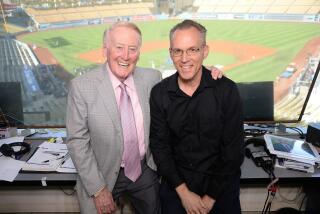Even at 60, Laver’s Spin Is Something to Behold
RANCHO MIRAGE — Rod Laver is standing in front of the car with the “Auzze” license plates and is surrounded by 34 pounds of cats, two of them, fuzzy and fat and looking for a way to sneak from the entryway into the forbidden inner reaches of the house.
But Laver is too quick. He steps smoothly in front of the door and allows human guests inside while keeping the kitties outside, looking in.
Which is all the answer anyone needs as to how Laver, “the Rocket,” has progressed in his recovery from a stroke he suffered last summer.
He plays golf just about every day and tennis two or three times a week. He has developed his own exercise program that incorporates weight work with tennis work and is proud to demonstrate how he couldn’t sit up on his own on the large, soft couch in the living room by tumbling over and then giggling.
Laver, 60, who suffered the stroke while taping an ESPN segment last August, asks immediately that the conversation not include his stroke.
“I’m afraid people will think I’m milking this,” he says.
And Laver also hesitates at first to talk about tennis as well.
“I’m not out on the tour,” he says. “What in the world do I know?”
This is a statement of breathtaking humility from a tiny man who seemed more a gigantic left arm with an insignificant human attached during his 23-year tennis career. He won the Grand Slam twice, in 1962 and again in ‘69, playing when pros and amateurs finally merged into a single tour.
Laver was a top-10 player from 1959 to 1975, he won 11 Grand Slam tournaments and helped introduce the art of topspin. He was an incessant attacker of the net and also a perpetual gentleman.
So Laver has to be sweet-talked into a chat about the game that he loves on the final weekend of the Australian Open, the championship tournament of his native country.
He notes that he has hit with Lindsay Davenport, when he was living in Newport Beach.
“I couldn’t believe how much taller she was than me,” says the 5-foot-8 Laver of the 6-foot-2 Davenport.
Laver is fascinated by the noisy emergence of a generation of tall, talented female players. Even as he is lamenting his lack of knowledge about the latest news from the tour, he is explaining the new rule about objects hindering play, the rule that cost Venus Williams a point when her beads broke loose during a quarterfinal match with Davenport.
Last week, Laver says, he had dinner with Pete Sampras, the world’s No. 1-ranked player who chose to skip the Australian Open this year to rest up.
Sampras’ decision to start this year on the sidelines has prompted some speculation that, at 27, he might be losing interest in the game, but Laver says he is convinced that “Pete will play until he is 30 or even 32. I don’t see any lack of enthusiasm. And I don’t think his physical skills are eroding any either.”
Laver says he understands why Sampras took time off and agrees with him that the tennis season, which begins in January and doesn’t officially end until Davis Cup finals the first week of December, is too long. Yet Laver seems surprised when asked how many weeks he would take off.
“None,” Laver says. “I played year-around. I always found it odd that someone would ask why I didn’t take time off. What else would I do? I loved playing tennis more than anything else. Why would I want to take time off?”
Why, indeed? It is that deep love of the game that came through loud and clear while Laver was playing. It didn’t matter if he was playing at Wimbledon or the U.S. Pro Indoor.
“I wanted to win and I wanted to be playing,” he says.
There’s an attitude that should be transplanted into the hearts of today’s pros.
Remember Marcelo Rios, the No. 2 player in the world, who said last year that he didn’t particularly need Wimbledon and might not bother to come back?
It would be nice if Rios could sit down with Laver someday, in the living room of Laver’s house and just listen. Of course, it’s more likely that Rios and dozens of other young pros would walk right past Laver without recognizing him.
Laver says he noticed at the Bob Hope Classic golf tournament last week how nice it was that golfers like Arnold Palmer were still visible, respected, beloved, important parts of big events. Certainly, young golf pros like David Duval and Tiger Woods know who Palmer is and would always sit down and listen if Palmer wanted to talk.
As Laver talks about the need for tennis institutions to do a better job of reaching into places other than country clubs and tennis academies to find future stars, of how tennis players need to make more of an effort to become known as people so that the game doesn’t fade into anonymity, a thought comes to mind.
What tennis also needs to do is find a way, as golf has done, to keep its past alive. A way to make the youngsters aware of Rod Laver and other living legends, of their wisdom and passion, of the way things used to be before big money.
For even if Laver still walks with a bit of a limp, even if his right side is still weak from the stroke, the Rocket can look ahead and see what should happen. And he can look back and know what did happen. And those players of the present should listen.
* Diane Pucin can be reached at her e-mail address: diane.pucin@latimes.com.
More to Read
Go beyond the scoreboard
Get the latest on L.A.'s teams in the daily Sports Report newsletter.
You may occasionally receive promotional content from the Los Angeles Times.










